| The most beautiful girl in Vienna (1879 - 1901) Alma was born in Vienna on 31 August 1879, daughter of landscape painter Emil Jakob Schindler and Hamburg singer Anna Sofie Bergen. Finances in the Schindler household were very tight, and the family had to share their apartment with Schindler's artist colleague, Julius Victor Berger, with whom Alma's mother soon began an affair, and from which Alma's half-sister Grete was born in 1881. In the same year, Schindler was awarded a prominent art prize, which ended the family's financial misery and enabled them to move to Schloss Plankenberg near Tulln. As a result of a commission from Crown Prince Rudolf in 1887 to paint the coastal localities of Dalmatia, Schindler became one of the most important artists of the Habsburg Monarchy. 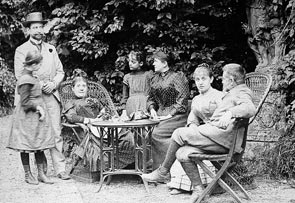 |  | 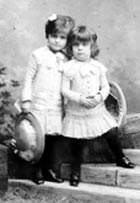 | | | | | | The family in the garden of Schloss Plankenberg
(right, the parents; left, Alma and painter Carl Moll) | | Alma and Grete,
her half-sister | Alma would keep her father company for hours in his studio. She idolized him, while he promoted her talent for music and her interest in literature, and even introduced Goethe's Faust to her while she was still a child. Alma's mother soon began an affair with Carl Moll, her husband's student and assistant; the relationship lasted several years and remained concealed from Alma's father. Schindler died on 9 August 1892 on the North Sea island of Sylt from the after-effects of an appendix infection. At the time, Alma was only 13. Her mother subsequently married Carl Moll, which Alma experienced as an unforgivable betrayal of her father. 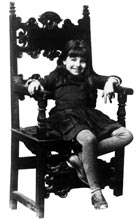 |  | 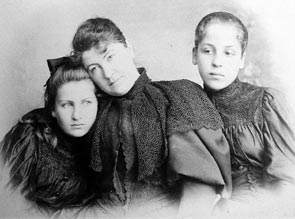 | | | | | | Alma aged 9,
in around 1888 | | Alma (left) with her mother Anna Schindler-Moll
and half-sister Grete (right), 1893 | Gustav Klimt
In April 1897, the "Vereinigung bildender Künstler Österreichs Sezession" (Association of Austrian Fine Arts Secession) was founded in Vienna. Gustav Klimt was elected President, and Carl Moll became Vice-President. The Association's members - Joseph Maria Olbrich, architect of the Secession building, architect Josef Hoffmann, Koloman Moser and Alfred Roller - were frequent visitors to his house. When she was just an adolescent, Alma was already allowed to join in the communal evening meals, and as a young beauty for the first time enjoyed the attention of famous men. At these frequent gatherings, Klimt's attention was drawn to Moll's 17-year-old stepdaughter Alma; he appreciated this very pretty and intelligent girl. For her part, Alma was attracted to the eminent artist, who was notorious for his lechery and seduction, and fell in love with him. In her diary, her romantic rhapsodies evolved into her first sexual experience:  | 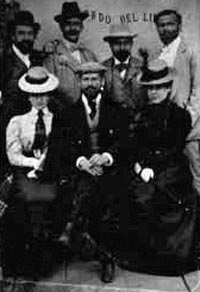 | | | | | | Alma (left) and her family, 1899,
at the Venice Lido. Right: Klimt | | | | "Gustav Klimt entered my life as my first great love, but I was an innocent child, totally absorbed in my music and far removed from life in the real world. The more I suffered from this love, the more I sank into my own music, and so my unhappiness became a source of my greatest bliss." Klimt pursued Alma as far as Italy during a holiday trip. They met secretly, and Alma was willing to swear eternal faithfulness to him. It was on this trip that Klimt stole a first kiss from Alma, the discovery of which led to a serious rift with Carl Moll. Moll discovered the scandalous flirtation and forced Klimt to leave and promise to keep away from Alma in future. Max Burckhard too was often a guest in the Moll household. Until 1898, he was Director of the Viennese Burgtheater, earning particular acclaim in connection with the ultivation of modern drama, putting on Ibsen, Hauptmann, Schnitzler and Hofmannsthal. He promoted Alma's nascent interest in literature, sent her theatre tickets, and brought her books of classic and modern literature in linen baskets. However, as an anti-Semite, he also indoctrinated her with anti-Semitism. In particular, Nietzsche's philosophy drew them together as kindred spirits. Nietzsche's sentence, "Whoever falls, should also be given a push!" became Alma's guiding motto, from which later many of her unsuccessful admirers were to suffer. 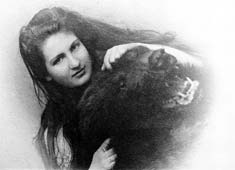 |  | 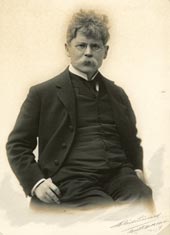 | Above: Alma aged 19
Right: Burgtheater Director Max Burckhard | Alma was tutored in composition by blind organist Josef Labor, and soon created an extensive repertoire for herself. Schubert and Schumann were among her favourite composers, but most of all she adored the music of Richard Wagner; "I am more endeared to him than anyone else on earth - I swear!" Alma also began composing herself, and played Lieder and piano pieces to her teacher, which were lyrical improvisations and soliloquies. Her style of composing was intimate, like the text of a diary. Alexander von Zemlinsky
In the spring of 1900, 20-year-old Alma met composer Alexander von Zemlinsky, who was considered one of the most promising figures on the Viennese music scene. Aghast, she noted the following in her diary: "A caricature - chinless, small, with bulging eyes and a maniacal way of conducting, yet he pleased me exceptionally." Alma and Zemlinsky spent a long time talking about Wagner, in particular Tristan. When Alma revealed to him that this was her favourite opera, Zemlinsky was so pleased that, according to her words, he became unrecognizable. "I like him very much - very much." When Zemlinsky had seen some of her compositions, his assessment was crystal-clear: "Either you compose or you spend your time in society - one of the two. But better to choose what suits you better - spend your time in society." Zemlinsky was an incomparable tutor; he was also Arnold Schönberg's teacher and soon became his friend. Alma now took composition lessons from Zemlinsky. Under his guidance, she composed a series of Lieder after poems of Rainer Maria Rilke, Heinrich Heine and others. A stormy love affair soon developed between Alma, an attractive and self-confident young woman, and the introverted Zemlinsky. She loved the "small, ugly gnome" and Zemlinsky returned these feelings: "I want you - with every atom of my feeling". Alma allowed herself to be kissed and caressed by him and allowed him every intimacy except the ultimate - thereby almost robbing him of his reason. He, for his part, understood how to awaken Alma's burgeoning sexuality with a passion, which meant she could never forget his "virtuoso hands". The relationship was a roller coaster of feelings, humiliations and torment on the part of Alma, mixed with passionate declarations of love and bizarre diary entries: "Alex - my Alex. I want to be your baptismal font. Pour your abundance into me!" However, family and friends found the liaison with the Jewish Zemlinsky extremely unsuitable - and soon Zemlinsky too had had enough: "You stress as often as you possibly can how ridiculously insignificant I am and how little I have, how much makes me unsuitable to belong to you! Have you got so much to give, such an infinite amount, that other beggars object?! You are very beautiful, and I know how much I appreciate such beauty. But what about later, in 20 years' time???"
Alma tortured Zemlinsky for one year, until the end of 1901, when she finally decided against him and in favour of a bold step which constituted a sensation for the Vienna of the day .... > next: Life with Gustav Mahler (1901 - 1911) | |
